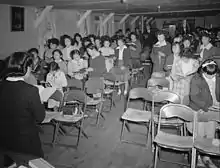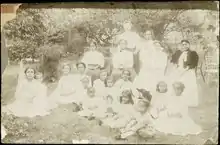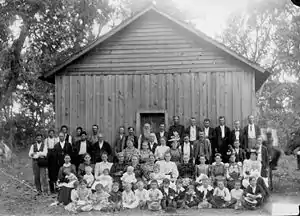Sunday school
A Sunday school is an educational institution, usually (but not always) Christian in character.


Sunday school classes usually precede a Sunday church service and are used to provide catechesis to Christians, especially children and teenagers, and oftentimes adults as well. Churches of many Christian denominations have classrooms attached to the church used for this purpose. Many Sunday school classes operate on a set curriculum, with some teaching attendees a catechism. Members often receive certificates and awards for participation, as well as attendance.
Due to the fact that Sunday school classes precede morning worship on the Lord's Day, many provide a light breakfast, such as doughnuts and coffee, except on days in which Holy Communion is being celebrated due to the fact that many Christian denominations encourage fasting before receiving the Eucharistic elements.[1]
Sunday schools were first set up in the 18th century in England to provide education to working children.[2] William King started a Sunday school in 1751 in Dursley, Gloucestershire, and suggested that Robert Raikes start a similar one in Gloucester. Raikes was editor of the Gloucester Journal. He wrote an article in his journal, and as a result many clergymen supported schools, which aimed to teach the youngsters reading, writing, cyphering (doing arithmetic) and a knowledge of the Bible.[3]
In 1785, 250,000 English children were attending Sunday school.[4] There were 5,000 in Manchester alone. By 1835, the Society for the Establishment and Promotion of Sunday Schools had distributed 91,915 spelling books, 24,232 New Testaments and 5,360 Bibles.[2] The Sunday school movement was cross-denominational. Financed through subscription, large buildings were constructed that could host public lectures as well as providing classrooms. Adults would attend the same classes as the infants, as each was instructed in basic reading. In some towns, the Methodists withdrew from the large Sunday school and built their own. The Anglicans set up their own National schools that would act as Sunday schools and day schools.[2] These schools were the precursors to a national system of education.[3]
The role of the Sunday schools changed with the Education Act 1870[3] which provided universal elementary education. In the 1920s they also promoted sports, and ran Sunday School Leagues. They became social centres hosting amateur dramatics and concert parties.[2] By the 1960s, the term Sunday school could refer to the building and rarely to education classes. By the 1970s even the largest Sunday school had been demolished. The locution today chiefly refers to catechism classes for children and adults that occur prior to the start of a church service. In certain Christian traditions, in certain grades, for example the second grade or eighth grade, Sunday School classes may prepare youth to undergo a rite such as First Communion or Confirmation. The doctrine of Sunday Sabbatarianism held by many Christian denominations encourages practices such as Sunday School attendance as it teaches that the entirety of the Lord's Day should be devoted to God; as such many children and teenagers often return to church in the late afternoon for youth group before attending an evening service of worship.
Development
United Kingdom
The first recorded Sunday school opened in 1751 in St Mary's Church, Nottingham.[5] Hannah Ball made another early start, founding a school in High Wycombe, Buckinghamshire,in 1769.[6] However, the pioneer of Sunday schools is commonly said to be Robert Raikes,[7] editor of the Gloucester Journal, who in 1781, after prompting from William King (who was running a Sunday School in Dursley), recognised the need of children living in the Gloucester slums; the need also to prevent them from taking up crime.[8] He opened a school in the home of a Mrs Meredith, operating it on a Sunday - the only day that the boys and girls working in the factories could attend. Using the Bible as their textbook, the children learned to read and write.[4]
In 18th-century England, education was largely reserved for a weathly, male minority and was not compulsory. The wealthy educated their children privately at home, with hired governesses or tutors for younger children. The town-based middle class may have sent their sons to grammar schools, while daughters were left to learn what they could from their mothers or from their fathers' libraries.[9] The children of factory workers and farm labourers received no formal education, and typically worked alongside their parents six days a week, sometimes for more than 13 hours a day.[10]
By 1785 over 250,000 children throughout England attended schools on Sundays.[4] In 1784 many new schools opened, including the interdenominational Stockport Sunday School, which financed and constructed a school for 5,000 scholars in 1805. In the late-19th century this was accepted as being the largest in the world. By 1831 it was reported that attendance at Sunday schools had grown to 1.2 million.[4] Robert Raikes's schools were seen as the precursors of the English state education system.[11]
The first Sunday school in London opened at Surrey Chapel under Rowland Hill. By 1831 1,250,000 children in Great Britain, or about 25 per cent of the eligible population, attended Sunday schools weekly. The schools provided basic lessons in literacy alongside religious instruction.[12]
In 1833, "for the unification and progress of the work of religious education among the young", the Unitarians founded their Sunday School Association, as "junior partner" to the British and Foreign Unitarian Association, with which it eventually set up offices at Essex Hall in Central London.[13]
The work of Sunday schools in the industrial cities was increasingly supplemented by "ragged schools" (charitable provision for the industrial poor), and eventually by publicly funded education under the terms of the Elementary Education Act 1870. Sunday schools continued alongside such increasing educational provision, and new forms also developed such as the Socialist Sunday Schools movement, which began in the United Kingdom in 1886[14]
Ireland
The earliest recorded Sunday school programme in Ireland goes back to 1777 when Roman Catholic priest Daniel Delany - later (1787) Bishop Daniel Delany of Kildare and Leighlin - started a school in Tullow, County Carlow.[15] This was a very sophisticated system which involved timetables, lesson plans, streaming, and various teaching activities.[16] This system spread to other parishes in the diocese. By 1787 in Tullow alone there were 700 students, boys and girls, men and women, and 80 teachers. The primary intent of this Sunday School system was the teaching of the Catholic faith; the teaching of reading and writing became necessary to assist in this. With the coming of Catholic Emancipation in Ireland (1829) and the establishment of the National Schools system (1831), which meant that the Catholic faith could be taught in school, the Catholic Sunday School system became unnecessary.
The Church of Ireland Sunday School Society was founded in 1809.[17] The Sabbath School Society of the Presbyterian Church in Ireland was founded in 1862.[18]
United States


The American Sunday school system was first begun by Samuel Slater in his textile mills in Pawtucket, Rhode Island, in the 1790s. Notable 20th-century leaders in the American Sunday School movement include: Clarence Herbert Benson, Henrietta Mears, founder of Gospel Light,[19] Dr. Gene A. Getz,[20] Howard Hendricks, Lois E. LeBar, Lawrence O. Richards and Elmer Towns.
Philanthropist Lewis Miller was the inventor of the "Akron Plan" for Sunday schools, a building layout with a central assembly hall surrounded by small classrooms, conceived with Methodist minister John Heyl Vincent and architect Jacob Snyder.
John Heyl Vincent collaborating was Baptist layman B. F. Jacobs, who devised a system to encourage Sunday school work, and a committee was established to provide the International Uniform Lesson Curriculum, also known as the "Uniform Lesson Plan". By the 1800s 80% of all new members were introduced to the church through Sunday school.[21]
In 1874, interested in improving the training of Sunday school teachers for the Uniform Lesson Plan, Miller and Vincent worked together again to found what is now the Chautauqua Institution on the shores of Chautauqua Lake, New York.
Form

In Evangelical churches, during worship service, children and young people receive an adapted education, in Sunday school, in a separate room.[22][23]
Historically, Sunday schools were held in the afternoons in various communities, and were often staffed by workers from varying denominations. Beginning in the United States in the early 1930s, and Canada in the 1940s, the transition was made to Sunday mornings. Sunday school often takes the form of a one-hour or longer Bible study which can occur before, during, or after a church service. While many Sunday schools are focused on providing instruction for children (especially those sessions occurring during service times), adult Sunday-school classes are also popular and widespread (see RCIA). In some traditions, the term "Sunday school" is too strongly associated with children, and alternate terms such as "Adult Electives" or "religious education" are used instead of "Adult Sunday school". Some churches only operate Sunday school for children concurrently with the adult worship service. In this case, there is typically no adult Sunday school.
Publishers
In Great Britain an agency was formed called the Religious Tract Society which helped provide literature for the Sunday School. In the United States the American Sunday School Union was formed (headquartered in Philadelphia) for the publication of literature. This group helped pioneer what became known as the International Sunday School Lessons. The Sunday School Times was another periodical they published for the use of Sunday schools.[24]
LifeWay Christian Resources, Herald and Banner Press, David C Cook, and Group Publishing are among the widely available published resources currently used in Sunday schools across the country.[25]
Teachers
Sunday school teachers are usually lay people who are selected for their role in the church by a designated coordinator, board, or a committee. Normally, the selection is based on a perception of character and ability to teach the Bible rather than formal training in education. Some Sunday school teachers, however, do have a background in education as a result of their occupations. Some churches require Sunday school teachers and catechists to attend courses to ensure that they have a sufficient understanding of the faith and of the teaching process to educate others. Other churches allow volunteers to teach without training; a profession of faith and a desire to teach is all that is required in such cases.
It is also not uncommon for Roman Catholic or Protestant pastors (church ministers) to teach such classes themselves. Some well-known public figures who teach, or have taught, Sunday school include astronaut Ron Garan, comedian Stephen Colbert,[26] novelist John Grisham,[27] and former U.S. president Jimmy Carter.[28]
See also
- Confraternity of Christian Doctrine
- Family integrated church
- Hebrew school (also called "Sunday school" by Reform Jews)
- Sabbath School
- Rite of Christian Initiation of Adults
- Sunday School (LDS Church)
- Sunday school answer
- Sunday School Society
- Sunday School Union
- Vacation Bible School
- Youth ministry
References
- Rowe, Mortimer, B.A., D.D. The History of Essex Hall. London:Lindsey Press, 1959. Full text reproduced here.[29]
- Kanel, Danny Von (2005). Building Sunday School by the Owner's Design. CSS Publishing. p. 69. ISBN 978-0-7880-2353-8.
- Collins, Louanne (1996). Macclesfield Sunday School 1796- 1996. Macclesfield, Cheshire: Macclesfield Museums Trust. ISBN 1-870926-09-9.
- Davies, Stella (1961). History of Macclesfield (Reprint 1976 ed.). Didsbury, Manchester and Macclesfield: E.J. Morten. pp. 219–225. ISBN 0-85972-034-9.
- Towns, Elmer L., "History of Sunday School", Sunday School Encyclopedia, 1993
- "Archived copy". Archived from the original on 2008-07-05. Retrieved 2012-04-18.CS1 maint: archived copy as title (link)
- "Robert Raikes and the Sunday School Movement". Archived from the original on 2007-10-08. Retrieved 2007-10-26.
- Churches and Churchgoers: patterns of Church Growth in the British Isles since 1700. Oxford: Clarendon Press. 1977.
- The Legacy of Robert Raikes - PhD Thesis. Nottingham University Library: Nottingham University. 2008.
- Centuries of Childhood: A Social History of Family Life. USA: Random House. 1965.
- When I was a Child. Stafford: Churnet Valley Books. 1903.
- "Full text of "The first fifty years of the Sunday school"". archive.org.
- The Rise and Development of the Sunday School Movement in England, 1780-1980. Christian Education Council. 1986.
- (Rowe 1959, chpt. 3)
- The Rise and Development of the Sunday School Movement in England, 1780-1980. Christian Education Council. 1986.
- Matthew, Russell, “Sketches in Irish Biography, No. 28, Dr. Daniel Delany”, The Irish Monthly, Volume 23, 1895.
- Rev. Martin Brenan, Schools of Kildare and Leighlin, A.D. 1775 - 1835, M.H. Gill and Son, Ltd, Dublin, 1935.
- "About the Sunday School Society".
- John M Barkley, The Sabbath School Society for Ireland, 1862 - 1962 (Sabbath School Society for Ireland, 1961).
- "Welcome - Gospel Light". www.gospellight.com.
- "About Gene - Bible Principles".
- "Sunday School Movement", Dictionary of Christianity in America, InterVarsity Press, 1990, p 1147
- Jeanne Halgren Kilde, When Church Became Theatre: The Transformation of Evangelical Architecture and Worship in Nineteenth-century America, Oxford University Press, USA, 2005, p. 159, 170, 188
- George Thomas Kurian, Mark A. Lamport, Encyclopedia of Christian Education, Volume 3, Rowman & Littlefield, USA, 2015, p. 229
- Little, Ellen. "Periodicals published by The American Sunday-School Union". University Library System, University of Pittsburgh. Archived from the original on 4 February 2012.
- Anderson, Don (11 November 2013). "Choosing Sunday School Curriculum: How Effectively Do You Want to Teach the Bible?". Faith.edu.
- Jean Lopez, Kathryn (October 25, 2010), Stephen Colbert's Sunday School
- Norton Jr, Will (October 3, 1994), Conversations: Why John Grisham Teaches Sunday School, Christianity Today
- "Maranatha Baptist Church". Maranatha Baptist Church. Plains, Georgia.
- "Archived copy". Archived from the original on 2012-01-16. Retrieved 2012-01-16.CS1 maint: archived copy as title (link)
Further reading
- Bergler, Thomas E. The Juvenilization of American Christianity. Grand Rapids, MI: William B. Eerdmans, 2012.
- Boylan, Anne M. Sunday School: The Formation of an American Institution, 1790–1880 (1990)
- Broadbent, Arnold. The First 100 Years of the Sunday School Association: 1833–1933. A centenary booklet issued by the Lindsey Press of the General Assembly of Unitarian and Free Christian Churches.
External links
| Wikiquote has quotations related to: Sunday school |
| Look up Sunday school in Wiktionary, the free dictionary. |
| Wikimedia Commons has media related to Sunday school. |
 Texts on Wikisource:
Texts on Wikisource:
- “Sunday School” in Manual of The Mother Church. 1917.
- "Sunday-Schools". The New Student's Reference Work. 1914.
- “Should Infidels Send Their Children to Sunday School?,” The Works of Robert G. Ingersoll. 1907.
- "Sunday-Schools". New International Encyclopedia. 1905.